Posts Tagged ‘Burma Government’ (94 found)
Protection and Security Concerns in South East Burma/ Myanmar
The peace process in Burma/Myanmar1 is at a critical juncture from which it could evolve into a transformative national dialogue or splinter into a divisive charade. While hopes for substantive and inclusive discussion about structural injustice remain, ongoing militarisation and attacks by the national armed forces2 are undermining the confidence of ethnic stakeholders. This report seeks to highlight the protection and security concerns of conflict-affected communities. […]
• • •Afraid to Go Home: Recent Violent Conflict and Human Rights Abuses in Karen State
The following report was prepared by Karen Rivers Watch (KRW), a coalition of six Karen organizations focused on the environment, women, youth, human rights and development issues. More information about KRW is provided on page 14.
This report is based on field interviews with local villagers and leaders of Karen armed groups, as well as media coverage of the recent conflict. It describes events that led to recent armed conflict between the Democratic Karen Benevolent Army (DKBA) and the combined force of the Burmese Army (BA) and Border Guard Force (BGF) in Karen State. Next, the report gives a detailed account of clashes that occurred along the Salween River in Hpa-an and Hpapun (Mutraw) districts. […]
• • •New Report Documents Recent Violent Conflict in Karen State
New Report Documents Recent Violent Conflict in Karen State
More than 2,000 villagers were displaced in October as fighting resumed in Karen State, the site of the world’s longest-running civil war. A report released today by Karen Rivers Watch (KRW) reveals that the outbreak of fighting – after two years of ceasefire negotiations […]
Par Gyi Killing Highlights Continuing Impunity in Southeast Myanmar
The recent killing by the Myanmar Army of the journalist Aung Kyaw Naing, also known as Par Gyi, highlights the need to end impunity in Southeast Myanmar, according to the Karen Human Rights Group (KHRG), a leading community based organisation in the region. […]
• • •Displaced Communities Await Political Dialogue in Myanmar
Bangkok/Yangon – As Myanmar’s government prepares to host the ASEAN Summit next week, conflict-affected communities are wondering if and how the peace process can get back on track. Negotiations for a nationwide ceasefire agreement are stumbling and national elections are due at the end of 2015. However, political dialogue to address ethnic conflict is essential to promote national reconciliation according to a new report from a consortium of relief and development agencies. […]
• • •New National Land Use Policy Must Reflect the Concerns of those Affected
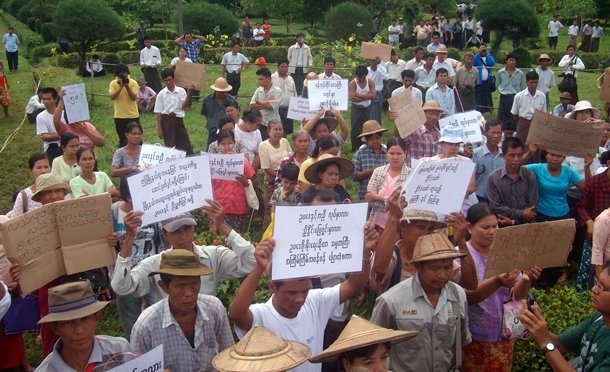 The Burma Government released its draft land use policy document and opened it up for consultations with the public. Despite this positive sign, the time for consultations is inadequate with no proper mechanism or space created for the meaningful participation of affected communities in order for their concerns to be reflected in the draft. The draft document itself has been heavily criticized for serving to further empower investors over small scale farmers.
The Burma Government released its draft land use policy document and opened it up for consultations with the public. Despite this positive sign, the time for consultations is inadequate with no proper mechanism or space created for the meaningful participation of affected communities in order for their concerns to be reflected in the draft. The draft document itself has been heavily criticized for serving to further empower investors over small scale farmers.
Since the beginning of the reform process in 2011, land grabbing, a practice that the previous military regime engaged in regularly, has hit new heights as a flurry of investors seek opportunities in previously untapped markets and the Burma Government liberalizes the economy. A prime example of this is the Dawei Special Economic Zone (SEZ) Project, a joint Thailand–Burma Government initiative that is seeking private investment to create one of the largest industrial zones in Asia. A report released by Dawei Development Association on 21 October 2014 highlights how 20-36 villages will be negatively affected. Concerns iterated by the local communities show that they have “lost farmlands and natural resources that are vital to their livelihoods, without prior information.” Furthermore “there was no meaningful consultation, and a deeply flawed compensation process.”
Land grabbing is often done with protection from the military, or by the military itself, for factories, infrastructure projects, mono-crop plantations, or military bases, and as with the Dawei SEZ case, usually without adequate or indeed, any compensation. It is a nationwide problem, both in ethnic areas, as documented by the Human Rights Foundation of Monland and Karen Human Rights Group, while in central Burma and delta areas, land grabbing is common place. Given that around 70% of the population of Burma is engaged in agriculture, and it is agricultural lands that are most often confiscated, it is one of the most pressing issues for Burma today […]
• • •နိုဝင္ဘာ ၁ ၊ ၂၀၁၄ ေန႔စြဲျဖင့္ အစိုးရထုတ္ သတင္းစာမ်ားတြင္ ပါရိွသည့္ ‘နုိင္ငံေရး အက်ဥ္းသားမ်ား ကူညီေစာင့္ေရွာက္ေရးအသင္း (AAPP)ႏွင့္ နုိင္ငံေရး အက်ဥ္းသားေဟာင္းမ်ားအဖြဲ႔ (FPPS) တုိ႔၏ တင္ျပမႈအေပၚ စိစစ္ခ်က္အရ အျခားျပစ္မႈ က်ဴးလြန္ခဲ့သူ ျပစ္ဒဏ္က်ခံဆဲ (၂၇)ဦး အမည္စာရင္း’ ထုတ္ျပန္ခ်က္ အေပၚ သေဘာထားေႀကညာခ်က္
နုိင္ငံေရး အက်ဥ္းသားမ်ား ကူညီေစာင့္ေရွာက္ေရးအသင္း (AAPP) ႏွင့္ နုိင္ငံေရး အက်ဥ္းသားေဟာင္း မ်ားအဖြဲ႔(FPPS) တုိ႔သည္ စတင္တည္ေထာင္ခ်ိန္မွစ၍ နိုင္ငံေရး အက်ဥ္းသား တစ္ဦးခ်င္းစီ၏ အမႈျဖစ္စဥ္မ်ား၊ အမႈတြဲဖိုင္မ်ား၊ စီရင္ခ်က္ မ်ားကို ရနိုင္သမွ် ေလ့လာစစ္ေဆး သံုးသပ္ျပီး၊ မိမိတို႔ ဖြင့္ဆုိထားသည့္နုိင္ငံေရး အက်ဥ္းသား အဓိပၸါယ္ ဖြင့္ဆိုခ်က္ႏွင့္အညီ နုိင္ငံေရးအက်ဥ္းသား စာရင္းကို ျပဳစု ခဲ့ျခင္းျဖစ္သည္။ […]
• • •Announcement of Treasury Sanctions Against Aung Thaung
WASHINGTON – The U.S. Department of the Treasury today designated Aung Thaung, a senior official of the Burmese Government, pursuant to Executive Order (E.O.) 13448. This action specifically designates an individual, Aung Thaung, and does not designate any Burmese government entity. […]
• • •“ဘိန္းႏြံတြင္းက ငိုရႈိက္သံ” အစီရင္ခံစာ
၁၈၈၆ တြင္ အထက္ျမန္မာျပည္ကို အဂၤလိပ္တို႔ သိမ္းပိုက္ၿပီးေနာက္ တရုတ္-ျမန္မာနယ္စပ္ တေလ်ာက္တြင္ အေရွ႕ေတာင္အာရွ၌ ဘိန္းစိုက္ပ်ဳိးထုတ္လုပ္မႈ စတင္ ထြန္းကား ရာေဒသ ျဖစ္လာခဲ့ သည္။ ျမန္မာႏိုင္ငံသည္ ၁၉၄၈ ခုႏွစ္တြင္ အဂၤလိပ္တို႔ ထံမွ လြတ္လပ္ေရး ရရွိခဲ့ေသာ္လည္း ရွမ္းျပည္နယ္မွ ဘိန္းစိုက္ပ်ဳိး ထုတ္လုပ္ မႈသည္ အနာဂတ္တြင္ ျပႆနာမ်ားျဖစ္ထြန္းမႈ ပိုမိုႀကီးထြား လာေစသည့္ မ်ဳိးေစ့မ်ားကို ခ်ထားၿပီး ျဖစ္ေနသည္။ […]
• • •
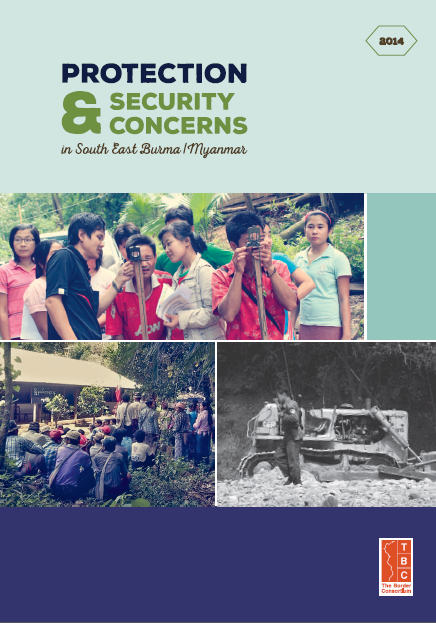
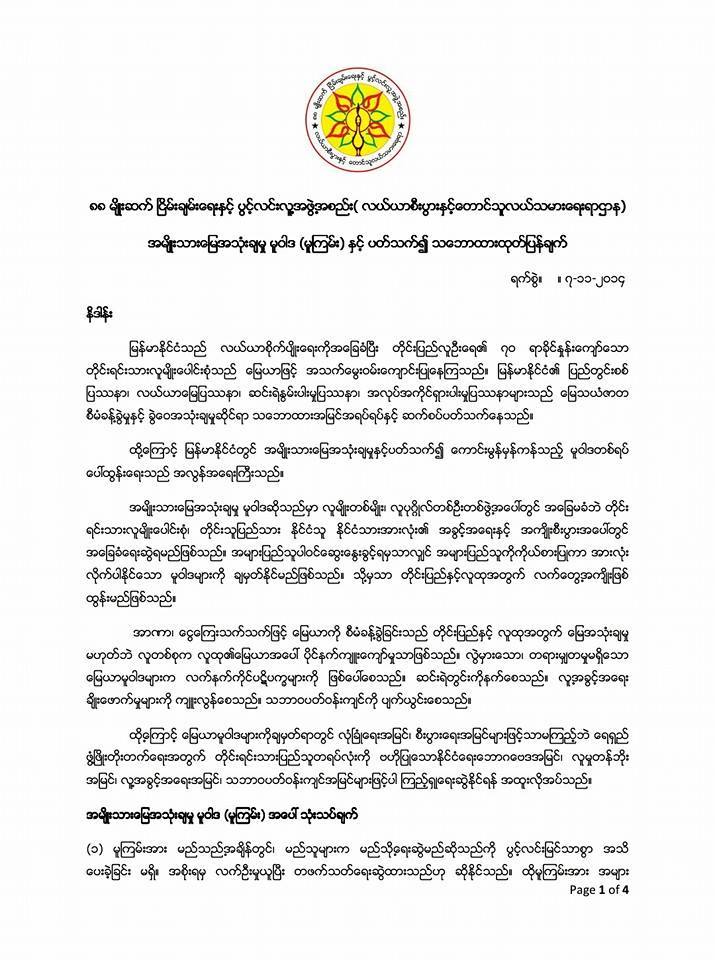
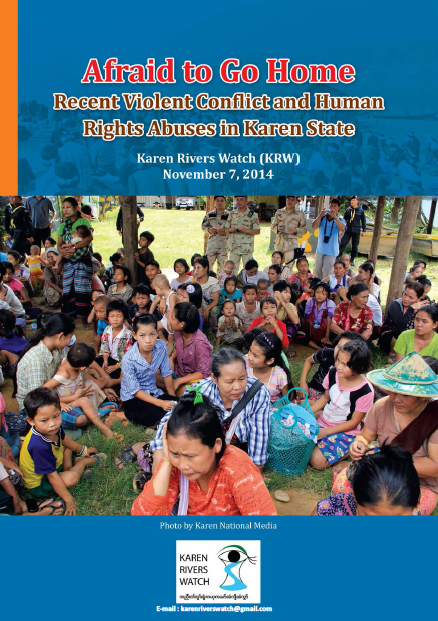
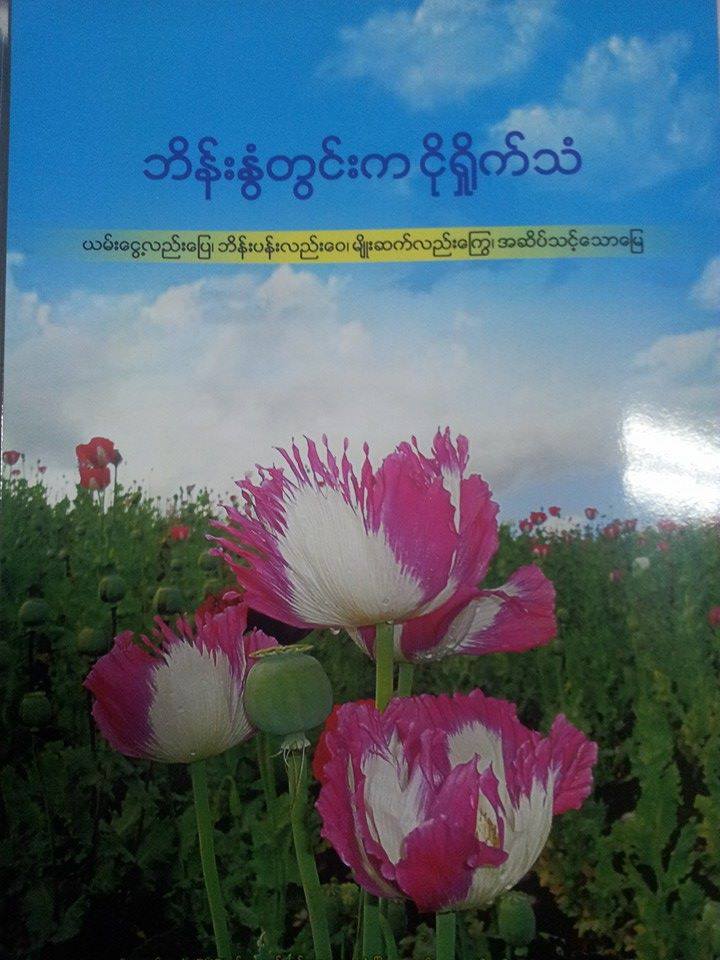








 All posts
All posts